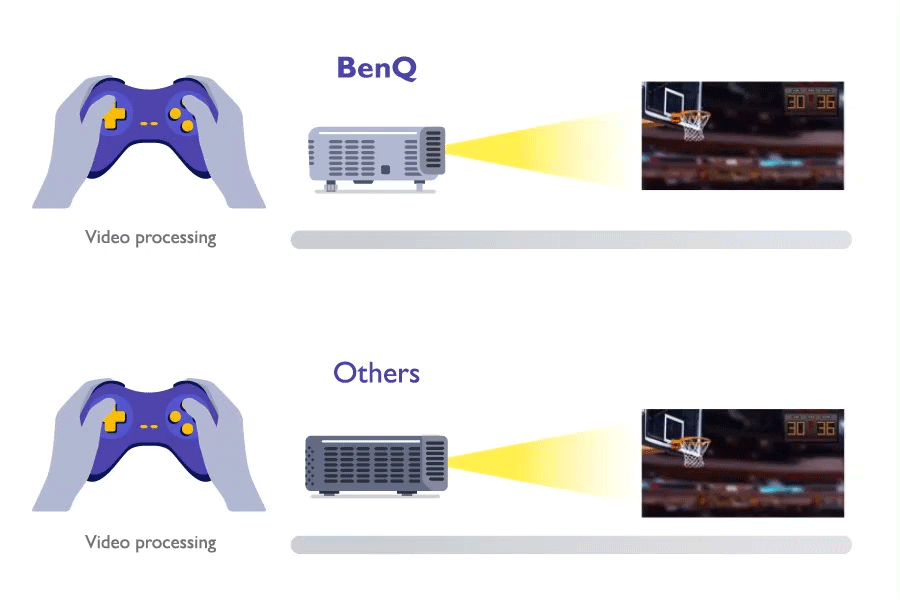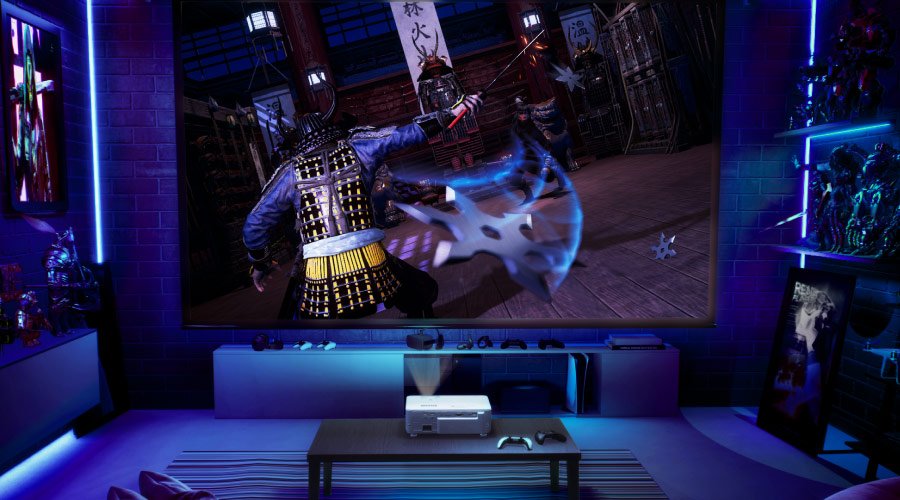A Comprehensive Guide to Choosing the Right Display for Your Gaming Needs
Are you worried about sacrificing image quality when upgrading to a big screen with a gaming projector? Many of us still have the memory of dim, blurry projectors from our school days or corporate use, which may lead to the assumption that projectors can’t deliver the vibrant, sharp visuals we’ve come to expect from TVs. However, modern gaming projectors have come a long way and offer a compelling option for gamers who want to enhance their gaming experience.
In this article, we’ll dive into the key differences between TVs, and gaming projectors, covering aspects like display quality, gaming environment considerations, game types, cost, and value. Whether you're looking for high refresh rates, immersive visuals, or the best setup for your gaming space, we’ve got you covered. If you’re pursuing a better gaming experience, you might find that a gaming projector is the perfect choice for you.


In This Article We Cover:
1. Understanding the Basics
The classic choice for many households, TVs offer a broad range of sizes, features, and price points. They deliver solid performance for both single-player and multiplayer games, providing a good balance of screen size, image quality, and smart capabilities.
2. Projector Overview:The dark horse of the gaming world, modern gaming projectors offer an experience that traditional displays can't match. They bring games to life with massive screen sizes and immersive visuals. Portable and versatile, projectors can turn any space into a dynamic gaming environment, perfect for those who want to feel like they’re part of the game.
3. Key Differences:-
Screen Size: Projectors offer the largest screen sizes, and TVs come in a wide range of sizes.
-
Resolution and Features: TVs often have higher refresh rates and more advanced gaming features compared to projectors.
-
TVs typically offer higher refresh rates (e.g., 4K 120Hz) compared to gaming projectors (e.g., 4K 60Hz).
-
It's important to note that 4K 60Hz is more than adequate for the vast majority of gaming experiences. Gaming projectors provide a unique advantage with their massive screen sizes and immersive visuals, making them an excellent choice for gamers who value cinematic gameplay over ultra-high refresh rates.
-
-
Immersion: Projectors provide a more immersive gaming and cinematic movie experience with larger displays, while TVs excel in clarity.
-
Portability and Flexibility: Projectors are generally more portable and can be easily set up in different locations. They can transform any space into a gaming area, making them ideal for on-the-go setups or gaming at a friend’s house.
-
Cost-Effective Large Display: Projectors offer a cost-effective way to achieve a massive display size. While large TVs can be expensive, a projector can provide a similar or even larger screen size at a lower cost.
2. Display Quality
Display quality is paramount in gaming, influencing how you perceive and engage with the virtual world. Each display type offers different strengths:
1. Resolution and Refresh Rate:TVs can offer higher refresh rates (e.g., 4K 120Hz) compared to gaming projectors (e.g., 4K 60Hz). However, it's important to note that 4K 60Hz is more than adequate for most gaming experiences. Gaming projectors provide a unique advantage with their massive screen sizes and immersive visuals, making them an excellent choice for gamers who value cinematic gameplay over ultra-high refresh rates.
2. Input Lag:Input lag is crucial for responsive gameplay, particularly in fast-paced or competitive games. Gaming projectors have significantly progressed, with many modern models featuring low input lag modes. These projectors deliver smooth, responsive gameplay, making them suitable for a wide range of gaming genres, from casual to competitive.


Today’s gaming projectors are a far cry from the dim, washed-out projectors of the past. Modern models feature advanced light sources (LED or Laser) that deliver bright, vibrant images, even in rooms with some ambient light. Enhanced contrast ratios ensure that images have depth and clarity, so shadows are detailed and highlights are crisp, contributing to a more engaging gaming experience.
4. HDR Support:High Dynamic Range (HDR) is a game-changer for visual quality, enhancing the range of colors and brightness in gaming. Both TVs and gaming projectors increasingly support HDR, offering stunning contrasts with deeper blacks and brighter highlights. This technology brings a more dynamic and realistic look to games, making every scene come alive with richer colors and sharper details. HDR support in gaming projectors makes the vast landscapes and intricate details in games feel more immersive and engaging.
5. Immersion:While TVs excel in delivering sharp, detailed images, gaming projectors elevate the experience by immersing players in expansive, cinematic visuals. The ability to project 100-150” screens creates a depth and realism that standard displays can’t match, making every gaming session feel like a blockbuster experience. The sheer size of the display can turn an ordinary room into a larger-than-life gaming arena, perfect for those who crave a fully immersive experience.
-
UHD and 4K:
-
Often used interchangeably, both refer to a resolution of approximately 3840 x 2160 pixels, which is four times the resolution of Full HD (1080p). This higher resolution provides sharper and more detailed images.
-
It is simply a higher resolution format.
-
-
HDR:
-
A technology that improves the contrast and color accuracy of a display. It allows for a greater range of luminance levels, meaning brighter whites and darker blacks, as well as more vibrant and accurate colors.
-
Requires compatible content and display technology to fully utilize its capabilities.
-
-
UHD and HDR serve different but complementary purposes in enhancing the visual experience. UHD increases the resolution, making images sharper, while HDR improves the quality of those images by enhancing contrast and color.
3. Gaming Environment Considerations
Viewing distance plays a crucial role in optimizing your gaming experience. Here’s a concise guide to help you choose the right screen size based on your room size and viewing distance.
Key Takeaways:
-
TV and Projector Size Matching: Larger screens, whether from traditional projectors or big TVs, are generally best for more spacious areas. However, projectors come in various types, including short-throw models which are designed to deliver a large image even in smaller rooms. This flexibility means you can enjoy an impressive viewing experience without overwhelming your space or compromising on screen size


Choose the Perfect Gaming Projector for Your Setup
4. Game Type-Specific Recommendations
Different types of games can benefit from specific display features. Here’s a breakdown of which display might be best for various game genres.
5. Cost and Value
When it comes to the cost of gaming displays, there’s a wide range of options from budget-friendly to premium models. Prices can vary significantly depending on the brand and model.
Key Takeaways:
-
TVs: Prices range widely, with high-end models offering more features and better display quality. A good mid-range TV provides excellent performance for both gaming and everyday use.
-
Projectors: While the initial cost of a projector might seem higher, the value they offer in terms of screen size and immersive experience is unmatched. Projectors provide a cost-effective way to enjoy a massive 80-150" screen, making them an excellent investment for gamers seeking a unique and captivating experience.
6. Pros & Cons
Each type of display has its advantages and disadvantages. Here's a summary of the pros and cons for each.
Key Takeaways:
When gaming with multiple people, a TV can feel cramped, forcing everyone to huddle close for a clear view. In contrast, a gaming projector offers a spacious, comfortable experience, allowing the group to spread out while still enjoying a massive, immersive display. The projector’s wide projection ensures everyone has a great view, enhancing the social aspect of gaming without feeling crowded.
Conclusion
It's evident that choosing the right gaming display goes beyond mere specifications; it's about enhancing your overall gaming experience. Gaming projectors offer an exceptional advantage with their massive screen sizes and immersive visuals, transforming your gaming setup into a grand, cinematic arena. The sheer scale and depth they provide can make every session feel like an epic adventure, making them an ideal choice for those who crave an expansive and engaging experience.
TVs offer versatility with large screens and built-in features, but they fall short in responsiveness and portability compared to projectors. If you’re looking to elevate your gaming experience and indulge in spectacular, immersive gameplay, a gaming projector could be the perfect addition to your setup.
If you would like to understand more FAQs about comparing TV to projector, please refer to this article.


Choose the Perfect Gaming Projector for Your Setup


The latest gaming projector discount and set-up tips






